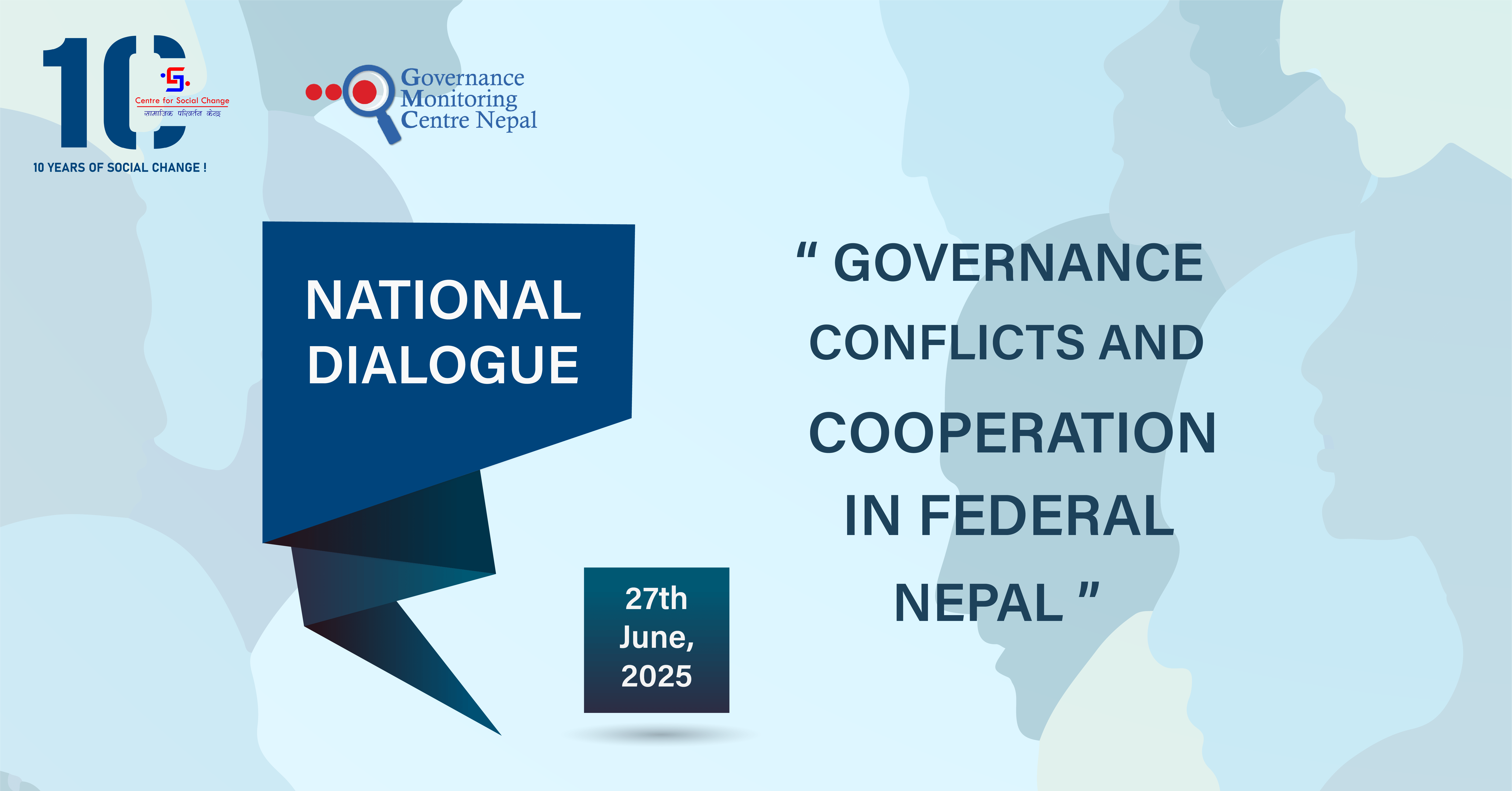Time: 1:30 PM to 4:30 PM
Date: Friday, 27th June, 2025 (13th Asar, 2082)
Registration Deadline : 24th June, 2025
Introduction
Nepal’s transformation into a federal governance post promulgation of the Constitution of Nepal 2015 was a landmark achievement aimed at devolving power, ensuring development, and addressing the historic marginalization of communities across its diverse geographic and social landscape. The 2015 Constitution laid the foundation for a three-tiered system of governance federal, provincial, and local each with constitutionally defined powers, rights, and responsibilities.
Ten years into this journey, federalism in Nepal has achieved several milestones: elected bodies are functioning at all levels, institutional frameworks have been developed, and there is a growing awareness of decentralized governance among citizens. However, these institutional structures have struggled to translate into effective governance due to a range of challenges, including intergovernmental conflict, weak coordination, overlapping jurisdictions, and limited legislative capacity. One of the key issues has been the emergence of developmental conflicts between the different levels of government over resource allocation, project prioritization, and implementation rights as well as persistent challenges in the law-making process at all three levels.
Despite federalism’s promise of inclusive governance, Nepal’s law-making process continues to be dominated by the executive, with limited consultation and participation from stakeholders and the general public. Provincial assemblies often lack the institutional and technical capacity to draft and debate laws effectively. Many bills are passed with minimal deliberation or are delayed due to political disputes and unclear legislative authority. Furthermore, developmental conflicts such as those concerning natural resource management, education, and infrastructure have intensified due to ambiguities in concurrent rights and the lack of clear mechanisms for intergovernmental coordination.
To critically examine these issues and propose a way forward, a national dialogue is being organized to bring together key actors involved in Nepal’s federal governance. This event aims to facilitate constructive reflection, identify bottlenecks, and develop policy-oriented recommendations for improving the quality and coordination of legislative processes in Nepal’s federal system.
Role of CSC in intergovernmental conflict transformation
Due to severe lack of research, database and evidence-based attempts to identify the root causes of governance related conflicts in young federal Nepal, and their solutions. To fill this gap, Center for Social Change (CSC) has been consistently working in the past few years, to closely study and monitor the governance related conflicts in Nepal, with larger focus on four areas-Natural Resources, Development, Ethnocultural and Political conflicts. Furthermore, CSC in coordination with various local levels has been actively conducting local level dialogues on local issues relevant to the four areas of focus.
Also, findings, learnings and knowledge obtained from these activities is continuously disseminated to the public through various forms of publications like study report, infographics, blog articles, etc. through Governance Monitoring Centre (GMC Nepal). GMC Nepal is a monitoring mechanism that aims to deconstruct the existing and potential intergovernmental conflicts as well as conflicts between people and state and share those evidence among key stakeholders responsible in its transformation or resolution mechanisms.
Objectives:
- The national dialogue seeks to reflect on Nepal’s federal experience over the past decade, identifying the structural, political, and institutional challenges that have emerged in development planning and law-making.
- Share with the relevant stakeholders about the results of the study on the conflict observed in the governance process, citizens dissatisfaction and barriers to law making process in Nepal.
- To foster cross-governmental and multi-stakeholder engagement to promote inclusive, transparent, and well-coordinated governance and law-making practices across all levels of government.
Themes for Discussion: Development Conflict, Citizen’s Dissatisfaction, Barriers in Law Making Process
In Federal Nepal, developmental conflicts have increasingly emerged due to disputes over infrastructure development, budget distribution, and the prioritization of projects. Tensions also arise from the management of forests, land, water resources, and public services, often compounded by overlapping jurisdictions. A notable example is the impact of triple taxation on community-managed resources, which has created significant friction between government levels and local stakeholders. The lack of effective cooperation among the federal, provincial, and local tiers of government has resulted in stalled or duplicated development initiatives, undermining efficiency and public trust.
The law-making process is similarly fraught with challenges. Executive dominance has curtailed the autonomy of provincial assemblies, as legislative agendas are primarily driven by the executive wing with little room for deliberation or local initiative. Provincial assemblies also struggle with limited capacity and resources to draft, analyze, and review legislation effectively. Further complicating the process are unresolved ambiguities around concurrent rights between different government tiers, which lead to delays and legal uncertainties. Moreover, the law-making process suffers from minimal stakeholder involvement and a lack of meaningful public participation, weakening the democratic foundation of legislative development.
These systemic issues have strained the citizen-state relationship and undermined democratic accountability. Channels of communication and coordination between citizens and their elected representatives remain weak, resulting in growing public dissatisfaction due to unfulfilled development promises and inadequate service delivery. Citizens increasingly voice grievances about being excluded from both legislative processes and development planning, which exacerbates their sense of marginalization. There is a pressing need to institutionalize mechanisms for public consultation and grievance redressal within federal governance structures to rebuild trust, foster accountability, and ensure inclusive decision-making.
Program Schedule
|
Time |
Activities |
|
1:15 PM |
Registration |
|
1:30 – 1:40 PM |
Welcome and Introduction-CSC |
|
1:40 – 2:10 PM |
Sharing of findings of CSC’s research and media monitoring |
|
2:10 – 3:10 PM |
Panel Discussion |
|
3:10 – 4:10 PM |
Open Discussion (Q & A) |
|
4:10 – 4:20 PM |
Closing |
|
4:20 Onwards |
Networking & Hi-Tea |
Note: We expect your presence 15 minutes early.
Registration Deadline : 24th June, 2025

